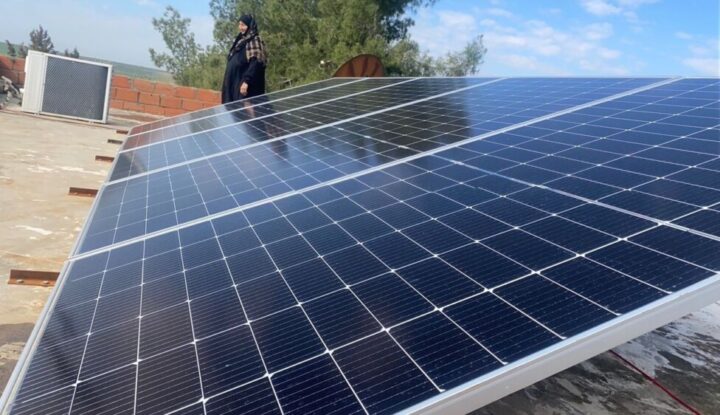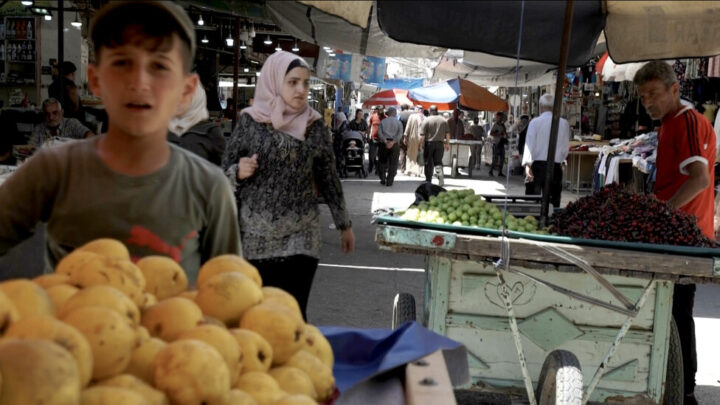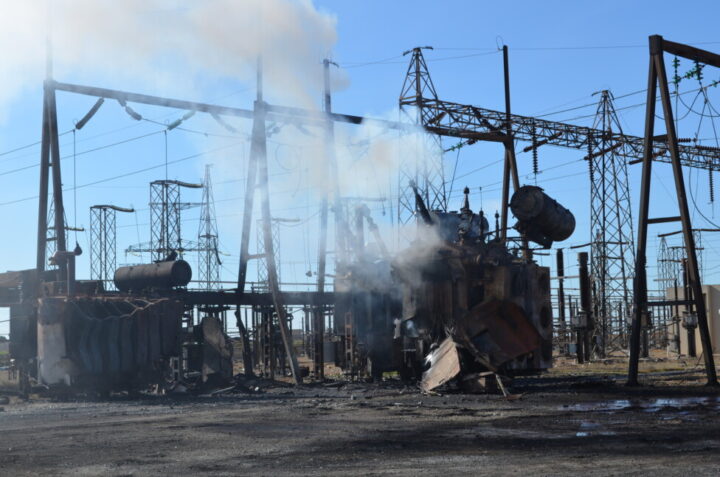QAMISHLI, Syria, Feb 29 (IPS) – The Ramsys, a farming couple from northeast Syria, by no means thought they’d spend virtually all their financial savings on photo voltaic panels. “We’ve paid 1,700 USD. We merely could not address darkness and being disconnected from the skin world,” Najma Ramsy tells IPS from her residence in Keshka, a small Kurdish village 70 km east of Qamishli.
Ramsy admits she nonetheless must familiarise herself with the brand new machine, mirroring the sky from the home roof. It is also a reminder of an ongoing risk.
“It is devastating. The Turks are shelling us virtually day by day. I’ll always remember how our home trembled when the oil pump station close by was hit,” she recollects.
Though under-reported within the worldwide media, bombing raids have been frequent forex on this area over the previous few years.
A report launched final January by the Rojava Info Centre —an impartial and volunteer-staffed organisation— factors to a “periodic airstrikes marketing campaign” performed by Turkey towards civilian infrastructures in Syria’s northeast. Furthermore, tons of of civilians have been killed.
The RIC says the bombing marketing campaign began when Ankara launched a cross-border assault towards the Syrian Kurdish area of Serekaniye in 2019, giving air help to Islamist militias on the bottom.
After the Istanbul assault on 13 November 2022 which killed six and wounded dozens, Turkish airstrikes and bombing intensified within the area. Ankara blamed the Kurds for the assault. Each the Kurdish Employees Get together (PKK) and the predominantly Kurdish Syrian Democratic Forces (SDF) denied any involvement in it.
Nonetheless, the bombing continued, and even gained momentum.
In October 2023, electrical energy, fuel, and oil amenities had been hit by airstrikes, inflicting intensive infrastructure and financial injury and worsening the already fragile humanitarian scenario in Northeast Syria.

One month later, Turkey performed new airstrikes following operations of the Kurdistan Employees’ Get together (PKK) towards Turkish navy bases within the mountains of the Iraqi Kurdistan Area, the place a number of Turkish troopers had been killed.
In retaliation, medical amenities, building materials factories, industrial websites and agricultural complexes which included grain silos and mills had been focused in Syria´s northeast.
“For the final 5 months, we had no entry to wash water, and our solely supply of electrical energy is to subscribe to group mills. We will solely afford 3 hours of electrical energy every single day,” 50-year-old Gulsin Malla advised IPS from her residence on the outskirts of the town of Qamishli, 700 km northeast of Damascus.
Not like the Ramsys, Malla hasn’t bought the cash wanted for a photo voltaic panel. “It might be like three yr’s price of wage, you understand?” she explains. Apart from, fuel has additionally turn into too costly.
In mid-January, no less than seven workers had been severely injured in an assault on the Suwadiyah fuel extraction plant, 85 kilometres southeast of Qamishli. The infrastructure which serves virtually a million folks has been continually focused by Turkish assaults within the final twelve months.
“Now we have been cooking on wooden. We have not had any fuel for over a month,” explains Malla. The fuel scarcity, she provides, has elevated its value tenfold.
“Add to the listing the difficulties to get medical provides and also you´ll perceive why we are saying it is like a `sluggish demise´ for us,” she says.

Jihadist risk
A Human Rights Watchreport printed final October confirmed that Turkish drone strikes on Kurdish-held areas of northeast Syria had broken vital infrastructure and resulted in water and electrical energy disruption for hundreds of thousands of individuals.
“These within the area already going through a extreme water disaster, now additionally bear the brunt of elevated bombardment, exacerbating their battle to get important water provides. Turkey ought to urgently cease concentrating on vital infrastructure vital for residents’ rights and well-being, together with energy and water stations,” HRW burdened.
IPS spoke to Kurdish Purple Crescent officers who pointed to “struggle crimes”. They described the scenario as “insufferable” and accused Turkey of “vandalising” the area. “The lack of important infrastructures is resulting in a rise in displacement from the area. Many are looking for their manner out, particularly to Europe,” KRC officers disclosed.
However Ankara has a totally totally different method.
In a televised deal with following a Cupboard assembly on January 16, Turkey’s president, Recep Tayyip Erdogan vowed to “widen navy operations towards teams linked to Kurdish militants in Iraq and Syria”. Turkish officers have repeatedly claimed the airstrike marketing campaign is concentrating on Kurdish “terror teams.”
“These claims by Ankara haven’t any credibility,” YPG (“Folks’s Safety Models”) —the primary Syrian-Kurdish armed contingent— media officer, Siyamend Ali, advised IPS from his workplace in downtown Qamishli.
“A lot of the casualties had been plain civilians, and a lot of the targets had been civilian infrastructures. Almost two million have been left with out electrical energy, to not point out water and healthcare,” added the official.
He additionally warned about different dangers.
”By concentrating on our infrastructures they’re suffocating our folks, however they’re additionally giving oxygen to IS to extend their actions once more,” he burdened.
The Kurds in Syria have been the primary allies of the worldwide coalition led by the US within the struggle towards IS. Over 10,000 Kurdish fighters had been killed.

In a cellphone dialog with IPS, Abdulkarim Omar, the consultant of the Autonomous Administration of North and East Syria to Europe claimed that Ankara’s foremost purpose is “to destabilize the Kurdish area and alter its demography.”
The Brussels-based Kurdish official additionally highlighted that two Syrian-Kurdish districts — Afrin and Serekaniye— are nonetheless below occupation by Turkey-backed Islamist teams in 2018 and 2019 respectively.
“Ours just isn’t solely a Kurdish administration as there are additionally Arabs, Syriacs, Armenians and Chechens dwelling amongst us. We cater for practically 5 million folks in northeast Syria. A million of them are Syrian struggle internally displaced folks,” Karim recalled.
The threats are seemingly piling up for all of them.
Fahad Fatta, a 43-year-old businessman from Qamishli, considered shifting together with his spouse and their three children to a small farm they personal near the Turkish border. However they do not dare go there any extra after they had been shot at from Turkish territory.
“The safety scenario is worsening by the day. We’re at all times nervous about our three youngsters, particularly when they’re away in school or enjoying exterior with their buddies,” Fatta tells IPS from his flat in Qamishli.
That police safety checkpoints have moved from their positions on the primary highway as a result of airstrikes is way from reassuring. IS remains to be energetic, and Fatta fears the Jihadists would possibly benefit from the safety hole.
“Now we have neither electrical energy nor fuel at house” he says. “We will barely afford a couple of amperes of the group generator however I am afraid these may very well be the least of our considerations.”
© Inter Press Service (2024) — All Rights ReservedUnique supply: Inter Press Service
